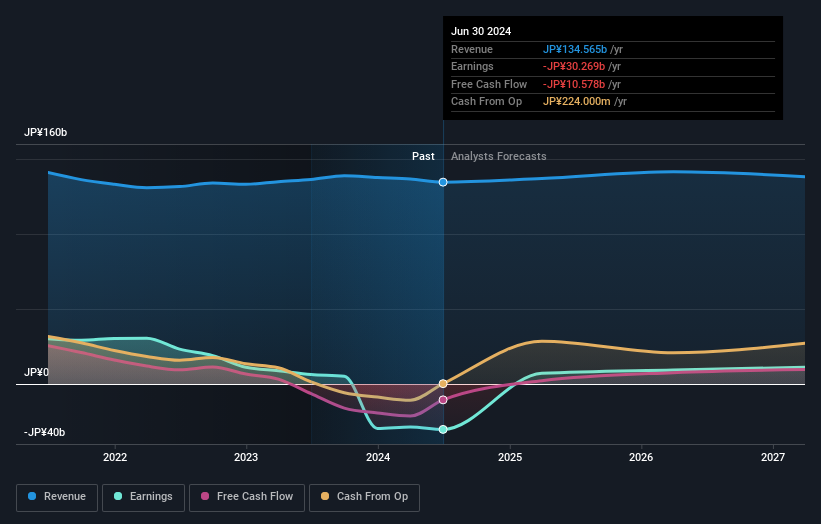- Japan
- /
- Entertainment
- /
- TSE:2432
retail investors who own 34% along with institutions invested in DeNA Co., Ltd. (TSE:2432) saw increase in their holdings value last week

Key Insights
- Significant control over DeNA by retail investors implies that the general public has more power to influence management and governance-related decisions
- 53% of the business is held by the top 8 shareholders
- 21% of DeNA is held by insiders
To get a sense of who is truly in control of DeNA Co., Ltd. (TSE:2432), it is important to understand the ownership structure of the business. And the group that holds the biggest piece of the pie are retail investors with 34% ownership. That is, the group stands to benefit the most if the stock rises (or lose the most if there is a downturn).
While retail investors were the group that reaped the most benefits after last week’s 8.7% price gain, institutions also received a 31% cut.
Let's take a closer look to see what the different types of shareholders can tell us about DeNA.
Check out our latest analysis for DeNA

What Does The Institutional Ownership Tell Us About DeNA?
Many institutions measure their performance against an index that approximates the local market. So they usually pay more attention to companies that are included in major indices.
We can see that DeNA does have institutional investors; and they hold a good portion of the company's stock. This implies the analysts working for those institutions have looked at the stock and they like it. But just like anyone else, they could be wrong. When multiple institutions own a stock, there's always a risk that they are in a 'crowded trade'. When such a trade goes wrong, multiple parties may compete to sell stock fast. This risk is higher in a company without a history of growth. You can see DeNA's historic earnings and revenue below, but keep in mind there's always more to the story.

DeNA is not owned by hedge funds. Our data suggests that Tomoko Namba, who is also the company's Top Key Executive, holds the most number of shares at 18%. When an insider holds a sizeable amount of a company's stock, investors consider it as a positive sign because it suggests that insiders are willing to have their wealth tied up in the future of the company. For context, the second largest shareholder holds about 14% of the shares outstanding, followed by an ownership of 4.6% by the third-largest shareholder.
We did some more digging and found that 8 of the top shareholders account for roughly 53% of the register, implying that along with larger shareholders, there are a few smaller shareholders, thereby balancing out each others interests somewhat.
While studying institutional ownership for a company can add value to your research, it is also a good practice to research analyst recommendations to get a deeper understand of a stock's expected performance. Quite a few analysts cover the stock, so you could look into forecast growth quite easily.
Insider Ownership Of DeNA
The definition of company insiders can be subjective and does vary between jurisdictions. Our data reflects individual insiders, capturing board members at the very least. Management ultimately answers to the board. However, it is not uncommon for managers to be executive board members, especially if they are a founder or the CEO.
Insider ownership is positive when it signals leadership are thinking like the true owners of the company. However, high insider ownership can also give immense power to a small group within the company. This can be negative in some circumstances.
Our information suggests that insiders maintain a significant holding in DeNA Co., Ltd.. It is very interesting to see that insiders have a meaningful JP¥42b stake in this JP¥197b business. It is good to see this level of investment. You can check here to see if those insiders have been buying recently.
General Public Ownership
With a 34% ownership, the general public, mostly comprising of individual investors, have some degree of sway over DeNA. While this group can't necessarily call the shots, it can certainly have a real influence on how the company is run.
Public Company Ownership
Public companies currently own 14% of DeNA stock. We can't be certain but it is quite possible this is a strategic stake. The businesses may be similar, or work together.
Next Steps:
While it is well worth considering the different groups that own a company, there are other factors that are even more important.
I like to dive deeper into how a company has performed in the past. You can find historic revenue and earnings in this detailed graph.
If you are like me, you may want to think about whether this company will grow or shrink. Luckily, you can check this free report showing analyst forecasts for its future.
NB: Figures in this article are calculated using data from the last twelve months, which refer to the 12-month period ending on the last date of the month the financial statement is dated. This may not be consistent with full year annual report figures.
New: Manage All Your Stock Portfolios in One Place
We've created the ultimate portfolio companion for stock investors, and it's free.
• Connect an unlimited number of Portfolios and see your total in one currency
• Be alerted to new Warning Signs or Risks via email or mobile
• Track the Fair Value of your stocks
Have feedback on this article? Concerned about the content? Get in touch with us directly. Alternatively, email editorial-team (at) simplywallst.com.
This article by Simply Wall St is general in nature. We provide commentary based on historical data and analyst forecasts only using an unbiased methodology and our articles are not intended to be financial advice. It does not constitute a recommendation to buy or sell any stock, and does not take account of your objectives, or your financial situation. We aim to bring you long-term focused analysis driven by fundamental data. Note that our analysis may not factor in the latest price-sensitive company announcements or qualitative material. Simply Wall St has no position in any stocks mentioned.
About TSE:2432
Moderate growth potential with mediocre balance sheet.


